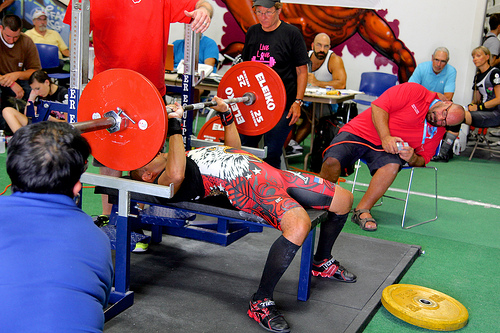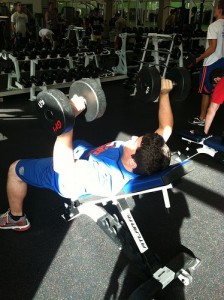Learn How to Improve Your Bench Press Using Three Training Principles
Overview.
- Millions of people suffer from Bench Press Plateau Syndrome (BPPS) every year and many are left undiagnosed.
- Start by following the training principles of specificity, progressive overload, and variation to help break through your bench press plateau.
- Specificity is the principle of performing activities specific to the demands of the individual.
- Progression enables an individual to continue making training improvements through providing a greater stimulus or intensity to training.
- Overload is a stimulus that stresses the body in a manner it is not accustomed to, causing it to eventually adapt to the stimulus and become stronger.
Millions of people suffer from Bench Press Plateau Syndrome (BPPS) every year and many are left undiagnosed.
Do you suffer from BPPS?
Have you reached a plateau in the bench press?
In this three-part series, we will discuss strategies for overcoming plateaus in the bench press using sound training principles.
We will begin with the foundational training principles of specificity, progression, and overload first to help break through your bench press plateau.
1. Specificity
Specificity is the principle of performing activities specific to the demands of the individual.
Does your Grandma play football to practice everyday tasks including crossing the street or safely getting in and out of the shower?
Specificity should be taken into account so the resistance training program meets the demands of the individual or group of individuals.
For instance, an American football kicker may perform hip-flexion (i.e. raising the thigh) exercises, including hanging-leg raises, to improve his punting power.
…or a long-jumper may practice back squats to increase his or her distance covered when jumping.
What can a powerlifter or recreational lifter do to improve his or her numbers on the bench press?
Bench press!
To improve the bench press, you must practice the bench press.
Remember, even when striving to improve the bench press, it is still recommended to follow a well-rounded training program for injury prevention and overall performance enhancement.
Furthermore, when following specificity and performing the bench press, training the opposing musculature (i.e. antagonists) and stabilizers with other movements is recommend.
Takeaway: While assistance exercises to complement the bench press will strengthen the joint movements necessary to execute the movement, take priority in performing the bench press to improve the bench press first.
Bench press more to bench press more.
2. Progression
Progression enables an individual to continue making training improvements through gradually providing a greater stimulus or intensity to training.
Proper progression should be conducted gradually and methodically to ensure optimal results.
Is performing a highly-complex Olympic weightlifting exercise when you barely know how to deadlift your pants on every morning an example of proper progression?
Dangerous?
…dangerous as having Grandma practice football to practice how to cross the street and safely move in and out of the shower.
Gradually progress in your bench press program by slowly overloading (explained further below).
Takeaway: Throughout your program, slowly use progression to reduce training staleness, injury potential, and to boost overall improvement.
3. Overload
Overload is a stimulus that stresses the body in a manner it is not accustomed to, causing it to eventually adapt to the stimulus and become stronger.
The body must be challenged beyond its current ability, or overloaded, to make progress.
Through various tactics to increase your bench press, you have probably already implemented overload through increases in training frequency, sets, or repetitions.
The following include several methods of overload:
- Increasing Volume
- Increasing Load/Intensity
- Higher Training Frequency
- Exercise Selection
- Accommodating Resistance
- Stable to Unstable
Progressive overload is a combination of the two principles for gradually imposing increased stress on the body to continue making training progress.
Every session or week, the intensity should be progressively ramped up to create a new challenge and overload.
Even starting from 70% of your current max and adding 5-10 pounds on the bench press each week can ultimately become a method of overload.
These foundational principles – specificity, progression, overload – lay the foundation of the bench press program (or any lift or skill) and can be used to attain higher numbers on the bench press.
Stay tuned for “How to Improve Your Bench Press, Part II” where we cover assistance exercises to improve the bench press, bench press frequency, and over 20 different variations of the bench press.





